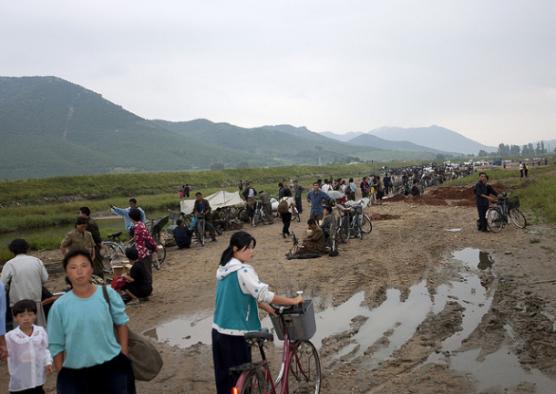Dear Esteemed Representative:
I am writing to advise you against voting to pass the North Korea Sanctions Enforcement Act – H.R. 1771. In the past I have constantly opposed sanctions (and their enforcement) for various reasons; some of which are included the following argument. There are numerous arguments which have been made by myself and other North Korea watchers that indicate sanctions as being counterproductive to inducing positive North Korean regime change.
H.R. 1771 could result in North Koreas 25 Special Economic Zones (SEZ’s) being turned into Korean People’s Army (KPA) bases over the coming years; and the steady dying off of (est.) 5-7% of their population per year until the new ‘KPA Regime’ balances at an equilibrium by which their scarce resources can sustain their new-found, totally isolated existence. In a situation of total containment and absolute sanctions, their population will continue to decline as they allocate more resources towards their military than to their population.
Point blank, the outcome of voting for H.R. 1771 could likely result in an increase in military and weapons buildup, and a significant decrease in the general population of North Korea. The reason I say this is because North Korea is a military-first regime, with its political survival as the center of its policy agenda. Their lowest priority in such a situation would be the quality of life or survival of their general population.
For this reason, I advocate for engagement. Engagement is a way of achieving the outcomes we desire to, within the barriers we face in dealing with North Korea. In recognition of this, the first argument I make follows the Hans Rosling economic model for positive social change which follows that everyone benefits from economic development in numerous way ranging from rule of law, to quality of life, to public health and democracy. We should be pumping money into the SEZ’s, not cutting them off.
The second argument follows that the SEZ markets do more than provide the people with an alternate means of survival in lieu of the collapsed Public Distribution System (PDS). They provide the most powerful weapon available to induce a peaceful collapse of the regime – independent thinking. Imposing any policy that hinders their economic growth castrates organic reform measures already taking place, thereby also preventing idealogical divorce from Party narratives and indoctrination.
North Korean defector Yeon-mi Park says: “this market economy has undercut the state distribution system of Songbun, which gives the regime the power to decide who can acquire wealth, get homes, medical treatment and decent food. It’s also a way of forging loyalty to the state. Yeon Mee Park says her generation are capitalistic and individualistic, with no devotion to the Kim dynasty that has ruled North Korea since 1948″.
Ironically, Yeon-mi, like most defectors, supports H.R. 1771 — but why? How can defectors possibly support something that none of them have ever read? Of every defector I’ve asked, they’ve all said “I haven’t read it and don’t know what it’s taking about, but I support it because my other defector friend does”. It is quite troublesome that defectors would be supporting something that will unbeknownst to them, hurt the very people who they are trying to help, and help the very regime they are trying to destabilize.
What will defectors be saying ten years after the passing of H.R. 1771?
North Koreans are becoming conditioned to “double-think-ing” a lifetime of regime indoctrination – on a daily basis – through talking on cellphones, listening to foreign broadcasts, and engaging in markets.
H.R. 1771’s closing of the borders, restricting of currency, and forcing of all levels of North Koreans to ‘tighten their belts’ by cutting off their access to support for their farms, markets, and technological ventures will return total Orwellian power to the head of the regimes Leviathan by re-centralizing their deteriorating Machiavellian ideologies.
North Korea is currently destabilizing in ways that we cannot yet fully understand. Kim Kyung-hui, Kim Jong-un’s aunt (and wife of Jang Song-thaek) is only alive because she was a main culprit in exposing her husband’s reform measures. Isn’t it ironic that her “health is now failing”, and that “she is being purged”; considering that she was the main proponent of Kim Jong-un’s succession to the throne?
The regime is becoming more politically unstable as the days go by. Grassroots revolutions and coups will take place if we simply stay the course, or better yet – empower markets and information into the country more forcefully. A policy to further aid these efforts would be more likely to induce a revolution in North Korea, resulting in a collapse unthreatening to Asian regional stability, than H.R. 1771 would.
A situation where revolution comes from within would be more likely to collapse the regime while maintaining stability in Asia, than the likely situation that could result from the passing of H.R. 1771.
In short, a “Korean Spring” is the most favorable approach to liberating North Korea, and that must come about through various forms of engagement – direct, tactical, subversive, and coercive to name a few.
For these reasons, I ask that you consider voting against H.R. 1771.
Respectfully,
Michael Bassett, MIS
Wounded Warrior
An Open Letter to the Senate: Sanctions Stifle the “Korean Spring”
Subject: An Open Letter to the Senate: Sanctions Stifle the “Korean Spring”
From: Michael Bassett
Date:
28
Mar
2015
Category:
















